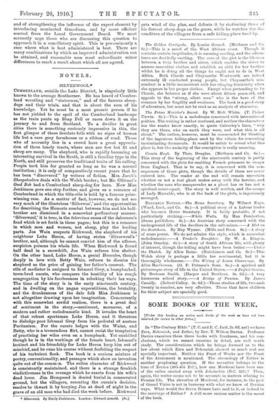NOVELS.
SILVERWOOL.*
CUMBERLAND, outside the Lake District, is singularly little known to the average Southerner. He has heard of Cumber- land wrestling and "statesmen," and of the famous sheep- dogs and their trials, and that is about the sum of his knowledge. Yet he must be a most prosaic person if he has not yielded to the spell of the Cumberland landscape as the train pants up Shap Fell or races down it on the journey to and from Scotland. To a dweller in great cities there is something curiously impressive in this, the first glimpse of these desolate fells with no signs of human Life but a rare grey farmhouse or a ribbon of road. Those who of necessity live in a crowd have a great apprecia- tion of these lonely tracts, where men are few but fit and sheep are many. The shepherd, who is rapidly becoming an interesting survival in the South, is still a familiar type in the North, and still preserves the traditional traits of his calling. People took him for granted so long as be was a normal institution ; it is only of comparatively recent years that he has been "discovered" by writers of fiction. Mrs. Jacob's Sheepstealers deals with the Welsh border; but Mr. 011ivant's Owl Bob had a Cumberland sheep-dog for hero. Now Miss Jenkinson goes one step further, and gives us a romance of Cumberland in which the title-role is held by a famous prize- winning ram. As a matter of fact, however, we do not see very much of the illustrious Sillerwoo7 and the opportunities for describing the Homeric combat between him and his half- brother are dismissed in a somewhat perfunctory manner. ' Silverwool,' it is true, is the teterrima cause of the dalesmen's feud which is set forth in these pages ; but this is a romance in which men and women, not sheep, play the leading parts. Joe Wain suspects Rickwood, the shepherd of his neighbour Luke Heron, of having stolen Silverwool's ' brother, and, although he cannot convict him of the offence, suspicion poisons his whole life. When Rickwood is found half dead in a snowdrift, Joe Wain refuses him shelter. On the other hand, Luke Heron, a genial Hercules, though deeply in love with Betty Wain, refuses to dismiss his shepherd as the price of gaining her father's consent. The role of mediator is assigned to Ishmael Grey, a humpbacked, town-bred curate, who conquers the hostility of his rough congregation by his fearlessness in rebuking their lax ways. The time of the story is in the early nineteenth century, and in dwelling on the pagan superstitions, the brutality, and the drunkenness of the dale folk Miss Jenkinson is not altogether drawing upon her imagination. Concurrently with this somewhat sordid realism, there is a great deal of sentiment in the story,—sentiment, moreover, of a modern and rather melodramatic kind. It invades the heart of that robust sportsman Luke Heron, and it threatens to dislodge poor Ishmael Grey from his pedestal of austere Puritanism. For the curate lodges with the Wains, and Betty, who is a tremendous flirt, cannot resist the temptation of practising her wiles even on a humpback. Yet unskilled though he is in the workings of the female heart, Ishmael's instinct and his friendship for Luke Heron keep him out of mischief, and he runs his course without forfeiting the respect of his turbulent flock. The book is a curious mixture of poetry, conventionality, and passages which show an invention quite out of the common. The sullen character of Rickwood is consistently maintained, and there is a strange freakish vindictiveness in the revenge which he exacts from his wife's dead lover. Jim Hempseed is denied burial in consecrated ground, but the villagers, resenting the curate's decision, resolve to thwart it by burying Jim at dead of night in the grave of an old man who had died the week before. Rickwood • SRverwooL By Emily Joni:hi:mon. London : Edward Arnold. 1.68.3 gets wind of the plan, and defeats it by stationing three of his fiercest sheep-dogs on the grave, while he watches the dis- comfiture of the villagers from a safe hiding-place bard by.










































 Previous page
Previous page